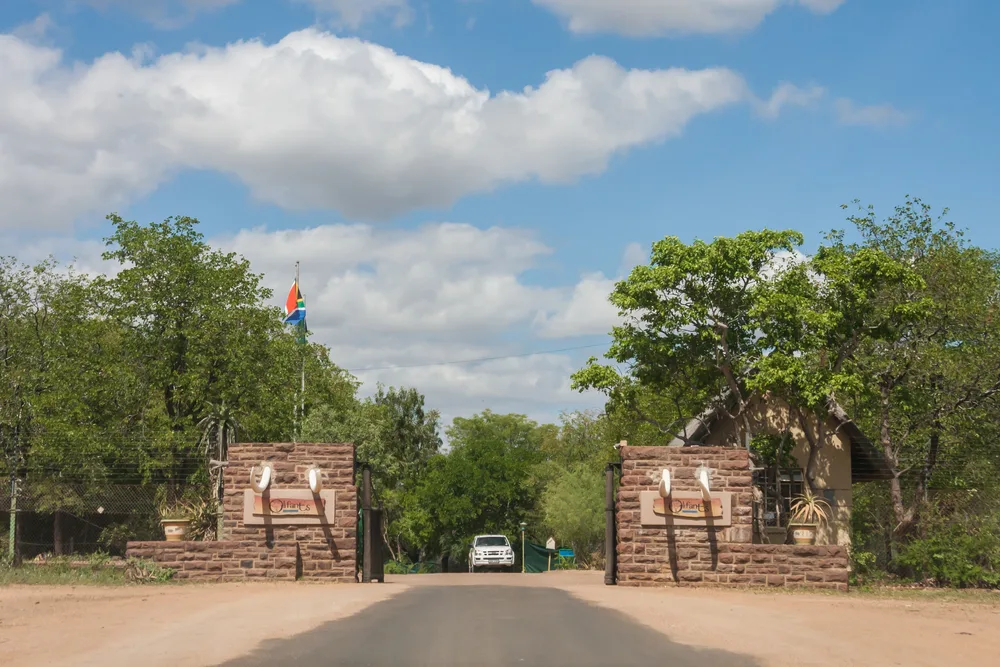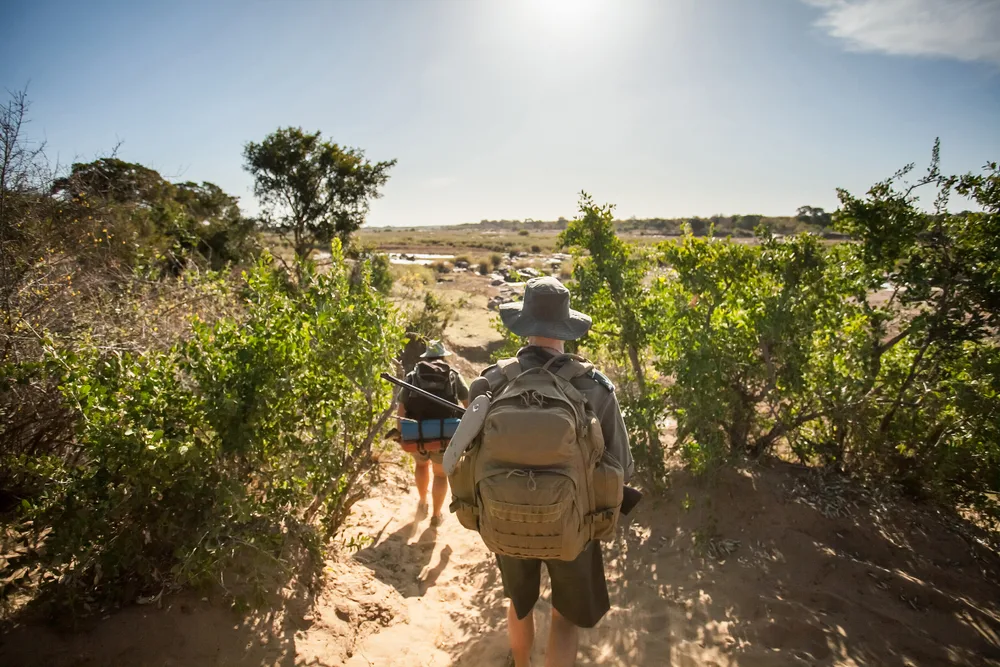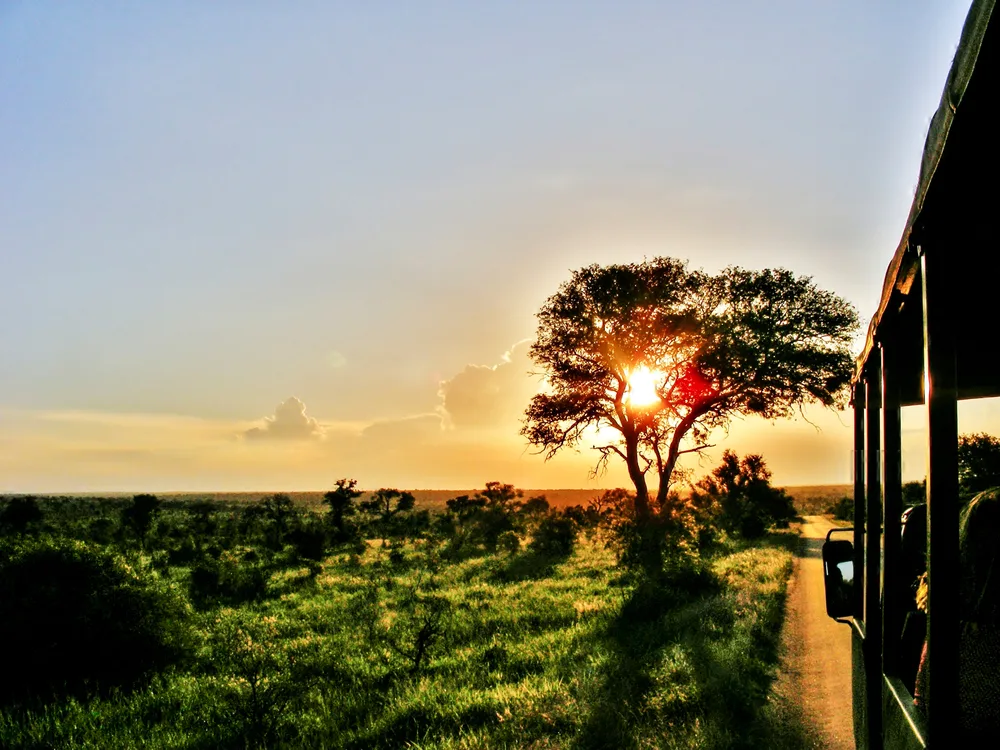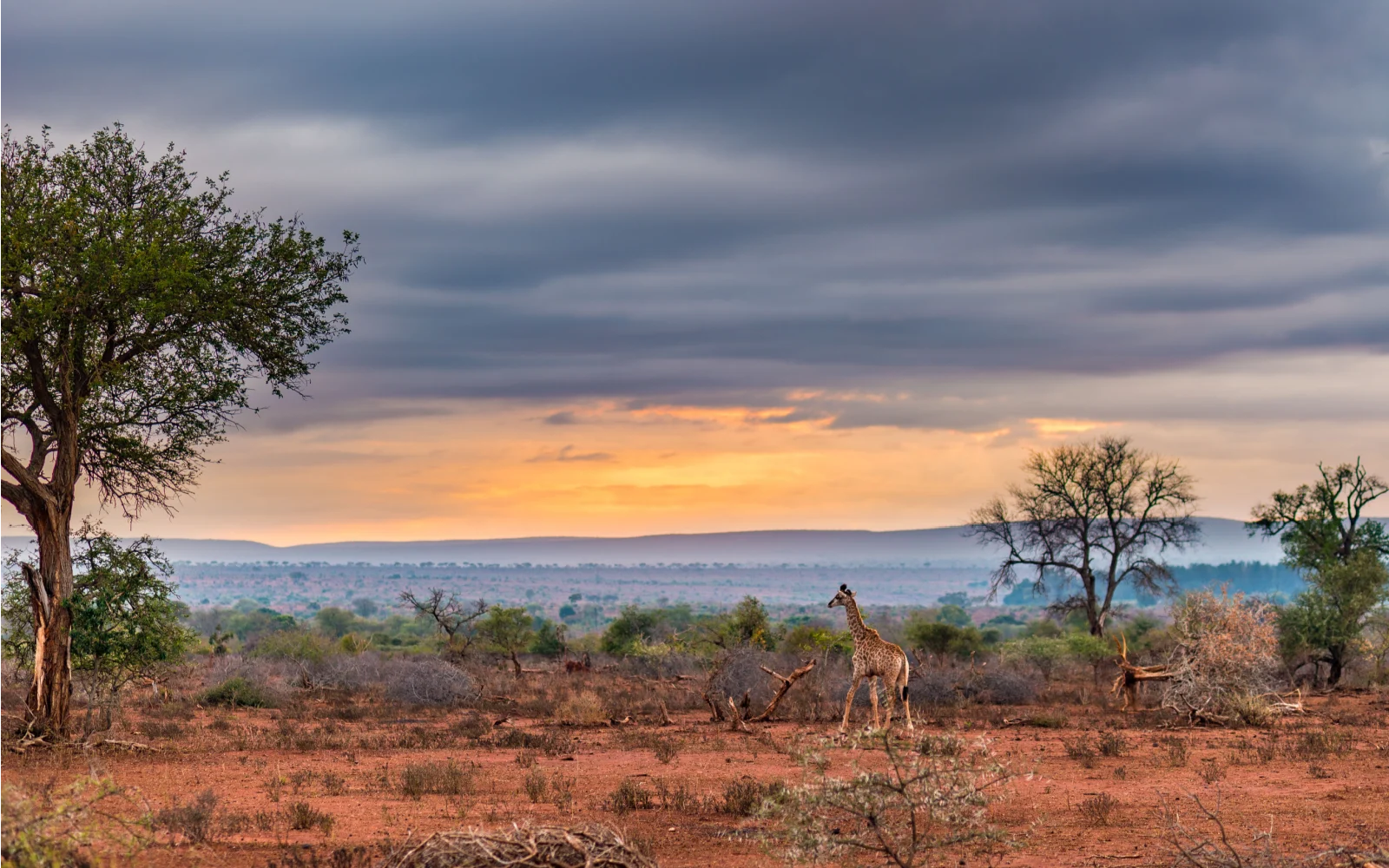For wildlife lovers, Kruger National Park in South Africa is a bucket list destination. The park is one of South Africa’s most popular tourist destinations, attracting over one million visitors annually.
It’s also home to some of the very best African safaris.
Visitors flock to Kruger National Park for an unparalleled safari experience. The Park is home to all of the “Big Five” game species that attract the most attention on safari: elephants, lions, leopards, rhinoceroses, and buffalo.
On Kruger’s famous safari drives, visitors can also see hundreds of bird species. You can take a guide tour or drive yourself on a safari for a breathtaking experience to get close to wildlife.
Some people may be nervous about visiting Kruger National Park as you really do get up close and personal with wildlife, and visitors are often concerned about the safety of being so close to elephants and lions.
Other visitors are concerned about more mundane safety threats such as crime. But don’t worry — our travel experts put together this travel guide to help you figure out if travel to Kruger National Park is right for you.
Keep reading for a detailed guide to all you need to know to safe while visiting Kruger National Park. Let us be your guide!
Is Kruger National Park Safe to Visit in 2024?

Olifants restcamp gate, Kruger National Park, South Africa, April 15, 2016: Vehicle leaving the Olifants restcamp gate. Kruger is a Big Five game reserve and a popular tourist attraction/Kelly Ermis/Shutterstock
Yes. Kruger National Park is a mostly safe destination when you visit South Africa, especially if you follow park rules.
The rules are there for a reason, to protect you from the animals in the park that are very much still wild. Recently, there has also been an uptick in crime in Kruger National Park, but the right precautions can keep you safe.
The important thing to remember when traveling to Kruger National Park is that it is a national park, not a zoo.
The park covers over 7,000 square miles of wildlife where animals are allowed to live completely naturally, according to the way their wild instincts tell them to live. They are not tame by any means.
To stay safe in Kruger National Park, you will need to follow certain rules that are in place to protect visitors. The park has a strict code of conduct for visitors, and violators will be punished as they are endangering themselves and others.
When you are going on a safari, whether a guided tour or self-driving, you must stay in your vehicle at all times except at designated rest camps or picnic spots which are protected from animals.
While the animals are accustomed to safari vehicles and know not to come near the 4x4s people drive through the park, there is no guarantee of your safety when you step out of the vehicle.
You should also take other precautions to make sure you watch the animals from a safe distance. Never feed or try to touch the animals — no matter how cute they are, remember that these are wild animals.
If you are driving yourself, you are only allowed to drive on authorized roads below a certain speed. Some visitors choose to stay overnight in Kruger National Park. You can stay in a private lodge or a campsite.
If you are camping in the park, you are only allowed to camp at designated campsites. Be sure that you are at your site before dark as authorities close the gates to campsites to protect visitors from wild animals.
Check posted closure times for each campsite when you book them. Besides wild animals, there are threats from other humans in Kruger National Park. The park receives many foreign visitors each year, making it a popular target for crime.
Common crimes inside the park include:
- Pickpocketing
- Scams
- Bag snatching
- Robbery
- Homicide
While most crime incidents are petty, you’ll notice that there are some violent crimes on the list of things to watch out for. Although the rate of violent crime in the park is low, you still need to watch out for this risk.
With basic preparation, you can avoid most negative incidents in Kruger National Park. Just make sure that you are aware of the potential dangers before you go.
Crime in Kruger National Park

Rich T Photo/Shutterstock
The animals are not the only cause for concern in Kruger National Park. Although the park itself doesn’t have many permanent residents, there have been crime occurrences in the area.
Most crime that occurs in Kruger National Park doesn’t directly affect visitors. For example, the most common crimes are poaching and corruption.
In early 2023, investigators published a report detailing a decade of endemic corruption in the park that has terrorized staff and endangered anti-poaching efforts. These crimes are serious and endangering the working of the park.
However, they are unlikely to directly affect the safety of visitors. There have been some theft incidents in Kruger National Park. Most thefts are done by monkeys and baboons that are ingenious about getting into campsites and lodges.
However, sometimes humans commit crimes in the park as well. You can usually avoid being the victim of a theft in Kruger National Park by taking basic precautions.
It’s difficult to find accurate crime statistics for Kruger National Park since there are so few full-time residents and crime incidents, but anecdotal evidence from fellow travelers advises you to remember to keep your guard up, even when surrounded by nature.
The biggest danger is not the park itself but the approach to the national park, as you have to drive through some unsavory areas. There have been more violent incidents in the area around Kruger National Park than in the park itself.
The United States embassy in South Africa even issued a travel alert for Numbi Gate in Kruger National Park and the road leading up to it following a spate of violent crimes.
You will have to exercise some precautions, and be sure to remember that the park is in South Africa after all, a country that suffers overall from a high crime rate. However, as long as you follow the advice of park authorities, you are well on your way to staying safe.
Theft
Wherever you travel, you should know that there is probably a risk of theft. Thieves often target tourists because they know that they are less aware of their surroundings and more likely to have valuables.
Thieves often operate in national parks because they know tourists will be there, and that tourists will be lulled into a sense of security because they are in a remote area.
Kruger National Park is no different. Many “thefts” in Kruger National Park are carried out by “criminals” who have four legs, long tails, and lots of fur.
Monkeys and baboons are responsible for many theft incidents, especially at picnic sites, campsites, and lodges. In the official park advice, Kruger National Park mentions that many monkeys and baboons wander around locked, gated camping areas.
Make sure that your things are secure and stored away as these animals are attracted by loose objects. Be especially careful with food and drink — never leave your food unattended.
Put uneaten food in a cage and you will need to hand some items in to the front desk when you check out. There are also some human thefts in Kruger National Park, particularly vehicle break-ins.
Thieves will take things from parked vehicles belonging to people going on a guided safari. Vehicle break-ins are also common on the roads leading to Kruger National Park, especially around rest stops and gas stations.
Whenever you are leaving your car, make sure that the doors are locked securely and that all windows are rolled up.
Don’t leave valuables visible in the car and try not to leave them in the car at all. If you are traveling with a group, make sure someone stays with the car at rest stops and gas stations while the rest of the group fuels up.
Robbery
Besides petty theft, there is a risk of more violent crime in and around Kruger National Park. The most common violent crime is robbery. In 2022, a German tourist was killed during an armed carjacking gone wrong just outside Kruger National Park’s Numbi Gate.
The area near this gate has seen a higher crime risk as well as more civil unrest and protests. Armed robberies are highly unlikely in the park, but you should still prepare for this risk as you are traveling towards the park.
Choose your itinerary carefully and research safe roads ahead of time. Be careful around roadblocks as those are common tactics highway robbers and carjackers will use. Try not to attract attention by flashing your valuables.
Avoiding Bad Areas

Sabie , South Africa – Sep 16 2018: Sign board showing entrance gate of Kruger national park , Numbi gate/Shams F Amir/Shutterstock
Avoiding bad areas around Kruger National Park can certainly help you minimize your risk of being the victim of a crime. The worst area in Kruger National Park is the area around Numbi Gate.
Officials dubbed it a crime hotspot even before the homicide mentioned above as there were several armed robberies and assaults on the road leading to the gate. The road outside the gate is outside the mandate of the park rangers, and law enforcement help is not easily available. Use other gates to enter the park.
Things to Consider
Here are a few other safety tips for visiting the park:
- You are not allowed to take any plants or leave any trace in the park itself. Violators are strictly punished. Be sure to always follow park rules.
- Kruger National Park is in a malaria-risk zone. Get antimalarial drugs before traveling there as a precaution and avoid visiting the park if you are pregnant. Take precautions to avoid mosquito bites.
- You can self-drive in the park, but road conditions are often tough, especially during rainy weather. A guided tour is more expensive, but also more secure.
- There have been thefts from bungalows and resorts before, so use a safe if your room has one or take your valuables with you while you are out on safari.
Frequently Asked Questions

Wilhelm Coetzee/Shutterstock
Here are some common questions that you may want to know the answers to before visiting Kruger National Park:
Is Kruger National Park safe for tourists?
Yes, Kruger National Park is safe for tourists. You will have to make sure that you follow all park rules to ensure your own safety, but if you do so, you should have a good time when you are there.
What are the major issues at Kruger National Park?
The biggest problems Kruger National Park experiences are corruption and poaching. Illegal development is also threatening the habitats of many animals. However, these are problems that rarely affect visitors directly.
What precautions should you take when visiting Kruger Park?
When visiting Kruger National Park, make sure that you keep a safe distance away from the animals. Even though the crime rates are low, never leave your valuables unattended. Finally, take precautions against bug bites by covering arms and legs and applying bug spray.
Is it safe to drive from Johannesburg to Kruger National Park?
Yes, it is safe to drive from Johannesburg to the park. The southern access road is well-traveled and well-maintained, and takes you to Paul Kruger gate, which is reasonably safe.
Can you swim in Kruger National Park?
Some campsites and resorts in Kruger National Park have pools for guests to swim in. However, you cannot swim in the rivers and watering holes around the park as those are home to sometimes-dangerous wildlife.
So, Is It Safe to Visit Kruger National Park?
Kruger National Park is one of the few places in the world where you can get up close to wild animals such as lions when they are still in their natural habitat and do so safely.
You will need to follow instructions carefully, but the experience is worth it.
There is some crime in the park, especially in the roads approaching some of the gates, but a few basic precautions and avoiding bad areas such as the Numbi Gate can keep you safe. If you visit South Africa, you should definitely visit the park.
So, with so much to see and do in a relatively safe environment, what are you waiting for — book your trip to Kruger National Park today!



